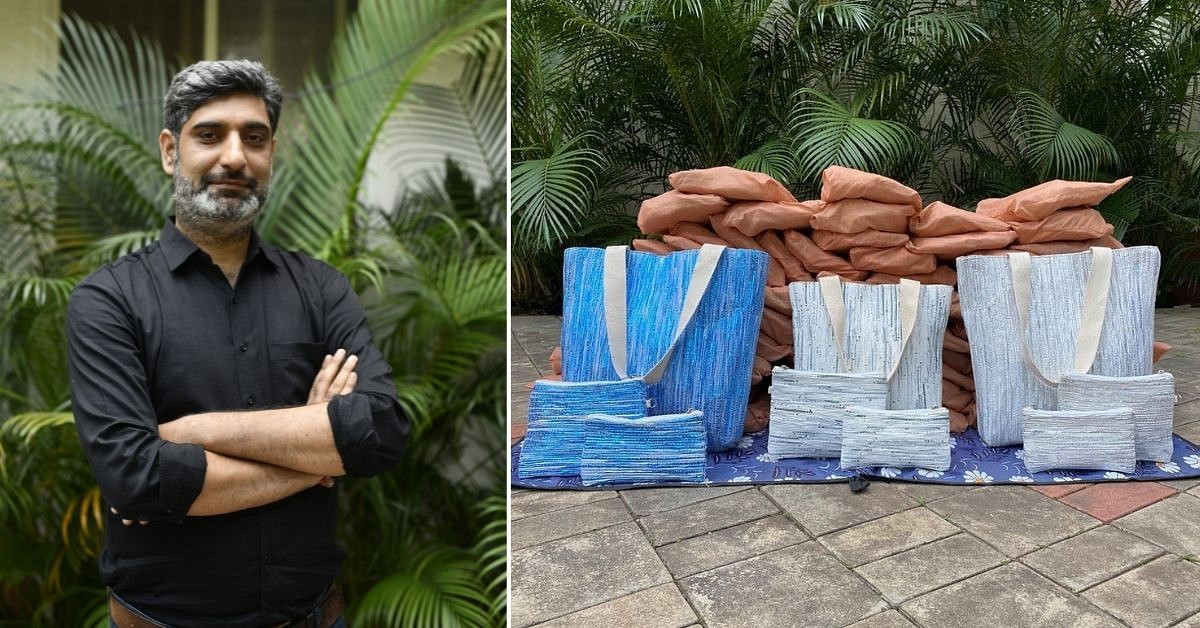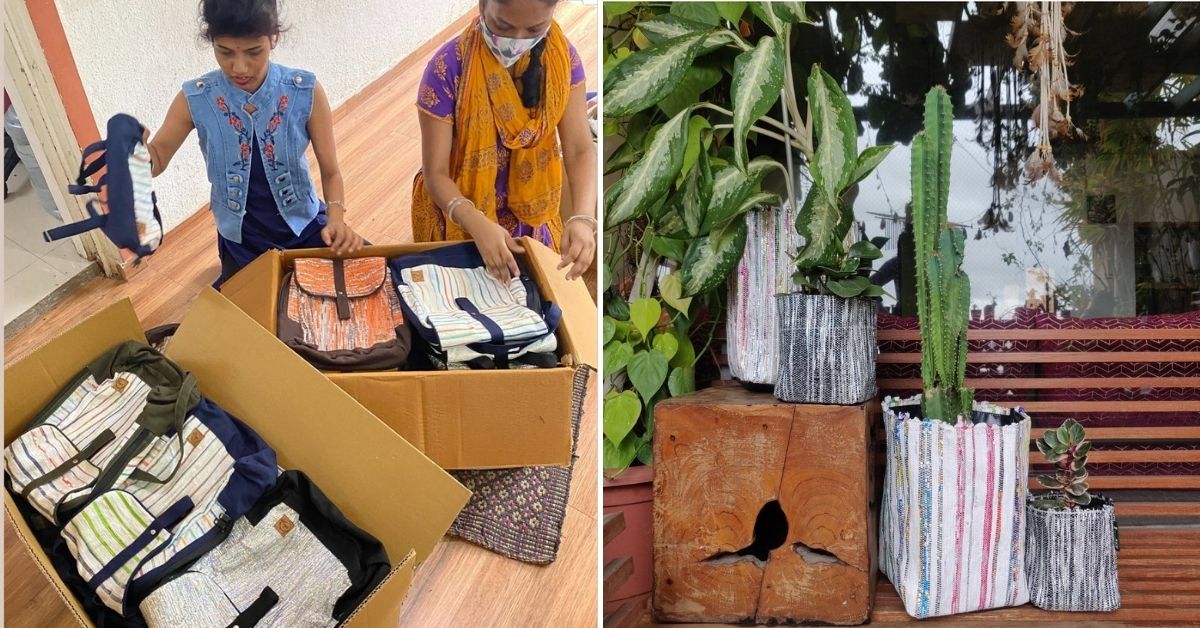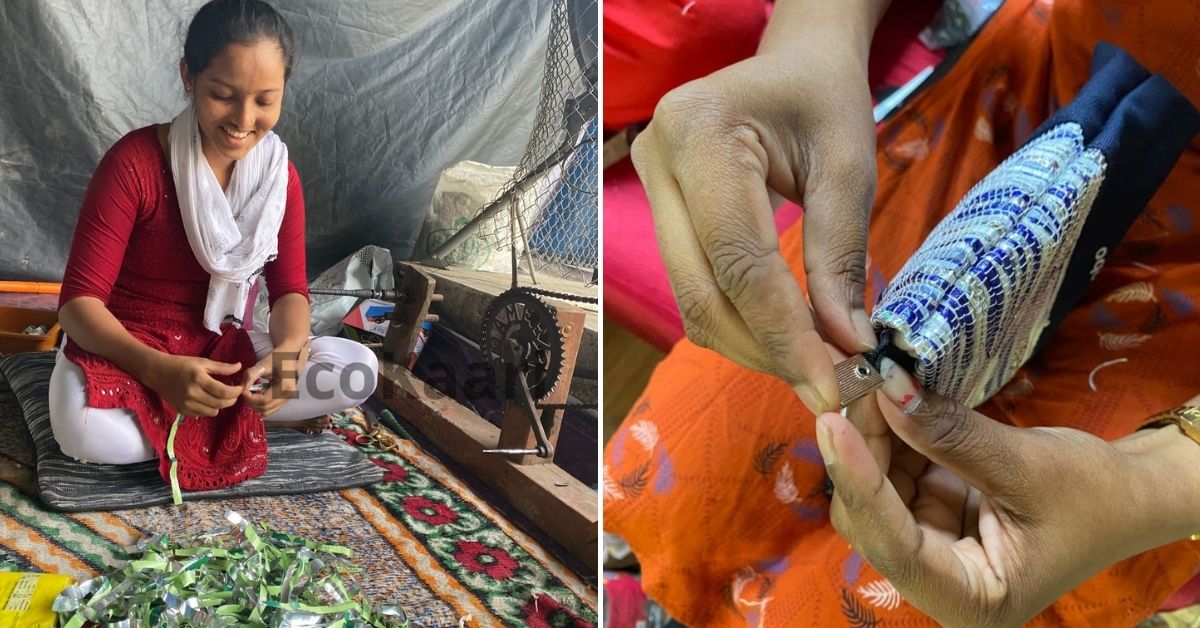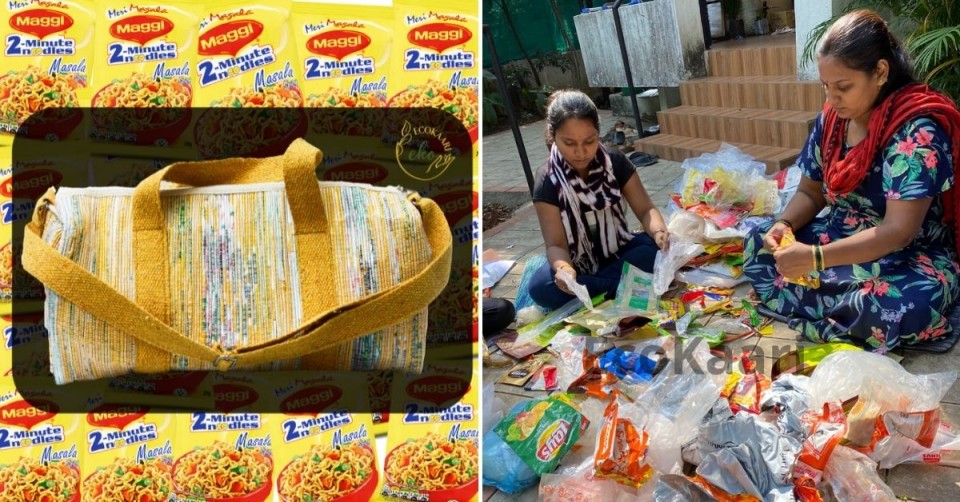Entrepreneur Upcycles 20 Million Plastic Bags Into Fabric, Earns Rs 8 Lakh per Month
Nandan Bhat’s Pune-based social enterprise, EcoKaari upcycles plastic waste into handcrafted fabrics using handlooms and wooden spindles (charkha).

It was in the early 2000s when Nandan Bhat started trekking with his friends. Over some time, he noticed a change in the environment at many of the trekking sites he visited. He observed that several such places were getting polluted due to the irresponsible disposal of plastic waste by tourists.
After a while, Nandan realised that it was mainly the plastic bags rather than other plastic items like bottles, that were strewn everywhere. “Waste plastic bottles always had takers as they fetch money. But nobody cared about the plastic bags and covers since they don’t have any commercial value,” Nandan tells The Better India.
As he started delving deeper into the issue, he felt the need to take matters into his own hands. Thus after a few trials and errors, in 2020, Nandan established his social enterprise EcoKaari, which upcycles plastic waste into handcrafted fabrics using handloom and wooden spindles (charkha) while providing a livelihood to the artisans in the region.
Now the social enterprise reels in a revenue of Rs 8 lakh per month and has mitigated nearly 20 million plastic bags from landfills.
To Upcycle Plastics
After deciding to work towards the eradication of plastic waste management, Nandan quit his corporate job in 2013 to start working in the Corporate Social Responsibility (CSR) field. During this period he had enough opportunities to be associated with several organisations that dealt with the management of plastics.
The experience he gained during his work guided him towards setting up his own initiative. “There was a social project in Ratnagiri by one of the government NGOs who conceptualised the upcycling of marine plastic waste by bringing in an alternate livelihood for the fishermen folk. This inspired me to explore the concept of upcycling by creating opportunities for the needy,” he explains.
Thus in 2015, Nandan started his first enterprise with one of his colleagues in Pune. “We started the upcycling initiative by working with a few households, whom we trained on handlooms. We used to provide them with raw materials and they used to make the fabric at home, which we collected later. But for some reason, the business model didn’t work out and we had to close the organisation,” he says.
“But I didn’t want to give up. So, I restarted the organisation with whatever savings I had,” he says, adding that he continued this work for four years.

Then in September 2020, he started EcoKaari with the same concept of environment conservation through upcycling plastic waste into handcrafted fabrics while helping the local artisans. “‘Eco’ stands for eco-friendly and ‘Kaari’ stands for Kaarigari (craftsmanship), which represents the two dimensions on which our enterprise is functioning,” Nandan says with a smile.
Being unsure of the market during a pandemic, he started the enterprise with just two artisans. “Within a few months of the launch, a social media influencer covered our story and the video went viral. It gave us a good boost and orders started pouring in,” he adds.
“Currently, there are 25 artisans who work for the enterprise,” says Nandan, adding that they work from their unit at Warje in Pune.
After several ups and downs, especially during the peak of the pandemic, he says that the enterprise currently has a decent consumer base across the country and even beyond. “Now we have several corporates coming in to place orders. We also have several export partners in different countries like Australia, Dubai, France, New Zealand, Singapore, UK, and the USA,” he says.
Ecofriendly ‘Kaarigari’

At EcoKaari, the upcycled fabrics are used to make daily utility items like handbags, accessories, home decor items and even office stationery products.
“The process starts with collecting plastic waste from different places. But we don’t collect all types of plastic as we are converting them into the fabric,” says Nandan. “We focus on collecting or accepting single-use plastics like polythene bags, multi-layered wrappers (chips, cookies, detergents, pulses and flour), plastic gift wrappers and even old audio or video cassette tapes.”
However, they don’t accept oil and milk packets (due to the smell and grease), small sachets of sauce, shampoo, tea or coffee, CDs and straws among others.
There are four main sources through which the enterprise collects plastic waste. Nandan elaborates, “There are several organisations who are into collecting plastic waste with whom we have collaborated. We also source plastic waste from several corporates who are into manufacturing. Then some eco-conscious citizens send us the plastic waste even via couriers. If these are not enough, then we depend on wholesalers.”
After their viral video, they received more help in their endeavour. “We started receiving plastic as couriers from different parts of the country. Now we get around 20 to 25 couriers daily,” he adds.
Talking about the process of making such upcycled products, he says that the entire process is done manually as they aim to create employment for artisans. “It begins with washing, sanitising and drying the plastic waste. Then we segregate them according to gauge and colour. We sort the plastic according to the colour, as we retain the original colour and don’t use any dye.”

He continues, “The segregated plastics are then cut into long strips which are then rolled on to the charkha and are then woven on the handloom to make the fabric.”
Then the design team takes over, he says, and the products are stitched with a final round of quality check.
“So far we have been able to upcycle close to 20 million plastic bags,” he points out.
Their products start from Rs 300 and go up to Rs 3,000 and are sold through their websites and different social media platforms.
“We pay the artisans starting from Rs 7,000 to Rs 15,000, depending on the kind of work they do,” he adds.
Mansi Waghmare, a 34-year-old who has been working at EcoKaari for the past year, says, “I have been mainly involved in the washing, segregation, cutting and weaving of the plastics. I used to work as a tailor before and never had a stable income but now I earn a regular income at this job. The earnings help me be independent and I can take care of my children’s needs and also the expenses at home.”
Nandan now aims to expand his enterprise to different parts of the country. “Even though it was a bumpy start, now the business has picked up and we are on the verge of reaching a turnover of Rs 1 crore this year,” he says.
For more information, you can visit their website or Facebook page.
(Edited by Yoshita Rao)
If you found our stories insightful, informative, or even just enjoyable, we invite you to consider making a voluntary payment to support the work we do at The Better India. Your contribution helps us continue producing quality content that educates, inspires, and drives positive change.
Choose one of the payment options below for your contribution-
By paying for the stories you value, you directly contribute to sustaining our efforts focused on making a difference in the world. Together, let’s ensure that impactful stories continue to be told and shared, enriching lives and communities alike.
Thank you for your support. Here are some frequently asked questions you might find helpful to know why you are contributing?


This story made me
-
97
-
121
-
89
-
167













